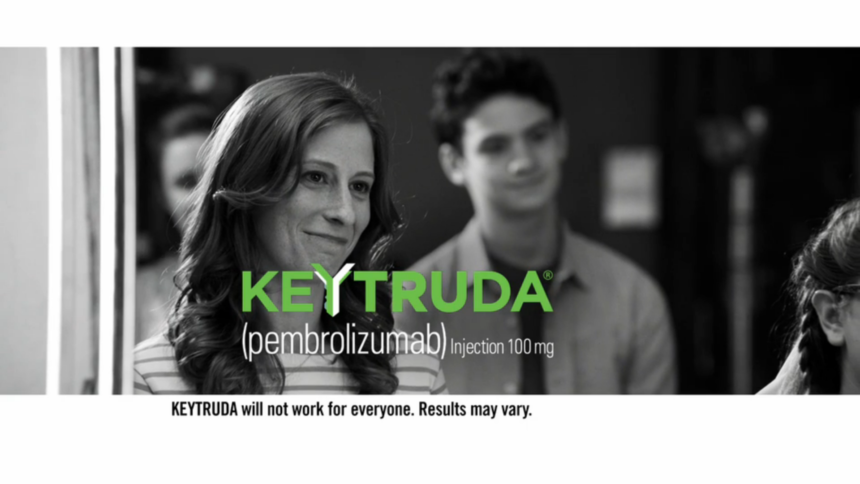Video courtesy of iSpot.tv.
Merck on Monday launched a direct-to-consumer campaign for Keytruda, just months after the drug became the first anti-PD-1 immunotherapy to receive a first-line indication to treat advanced lung cancer.
The black- and- white ad tells the story of a woman — an actor portraying a patient — diagnosed with advanced non-small cell lung cancer. She thought her diagnosis meant the start of chemotherapy and would leave her with only months left to live. After finding out that her tumors expressed high levels of the PD-L1 protein, which is a biomarker for Keytruda, she learned she now had a new treatment available to her. She said her scans after treatment with Keytruda showed “good news.”
See also: Merck’s Keytruda wins approval in first-line lung cancer
The company has spent an estimated $1.2 million on Keytruda ads Monday and Tuesday for 77 broadcasts, according to iSpot.tv.
Merck did not immediately respond to requests for comment.
The ninety-second spot, “Sharon’s Tru Story,” likely signals a shift in the drugmaker’s marketing strategy, which until now focused on targeting doctors through professional journal ads. Bristol-Myers Squibb in October 2015 launched a DTC campaign for Opdivo, a competing immunotherapy.
See also: Merck kicks off lung-cancer campaign
Merck’s new campaign comes at a time when the drugmaker is within reach of pole position over Opdivo, a competing immuno-oncology drug. BMS’ bid for using Opdivo in first-line lung cancer was delayed in August after a clinical-trial failure. Merck secured FDA approval for Keytruda in advanced first-line lung-cancer in October.
Merck reported sales of $919 million for the first nine months of 2016 for Keytruda; Opdivo saw sales of $2.4 billion in the same period.
BMS employed ads for Opdivo after it was approved in treating advanced lung cancer in the second line. Credit Suisse analyst Vamil Divan has said that DTC is the go-to strategy for first-in-class products because of the need to raise awareness about a disease, condition, and new type of therapy.
See also: Merck outspends Bristol-Myers Squibb on journal ads for Keytruda
An agency executive told MM&M that Merck is likely “feeling the heat of continued Opdivo success and decided it’s time to build consumer awareness,” adding the ad makes “the point about first-line early and with prominence, but they have to work hard to establish a confusing point about biomarkers. I feel like the the first-line message got faded in the legalese.”
Merck in November kicked off an unbranded campaign to raise awareness about certain types of lung-cancer in an effort to encourage people with non-small cell lung cancer to have their tumors tested for biomarkers, like PD-L1, an important bellwether for how Keytruda will perform.







